Urgent Care

If you need medical care quickly, but don’t require a trip to the emergency department, you can rely on The University of Kansas Health System's urgent care team. You can see a provider without an appointment at our urgent care locations throughout the Kansas City area and in Great Bend or through an urgent care video visit in the comfort of home. Several locations also offer scheduled in-person visits.
Use urgent care for concerns like asthma, allergies, coughs, fevers, rashes, sore throats, headaches or vomiting.
Find urgent care details – like addresses, hours, wait times and available same-day or next-day appointments – within MyChart. You can go directly to an urgent care location for walk-in care, no appointment needed. See walk-in hours listed below. Note that scheduled appointments may be available outside of walk-in hours. Feel free to tell the urgent care team you’re coming by clicking the I’m On My Way button in MyChart.
Urgent care locations and walk-in hours
-
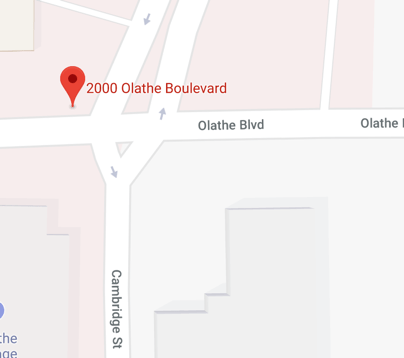 1. Urgent Care, Medical Pavilion
1. Urgent Care, Medical Pavilion- Urgent Care
- 2000 Olathe Blvd., Level 1, Suite D
- Kansas City, KS 66160
Office Contact: -
 2. Urgent Care, KU MedWest
2. Urgent Care, KU MedWest- Urgent Care
- 7405 Renner Road, Pod D
- Shawnee, KS 66217
Office Contact: -
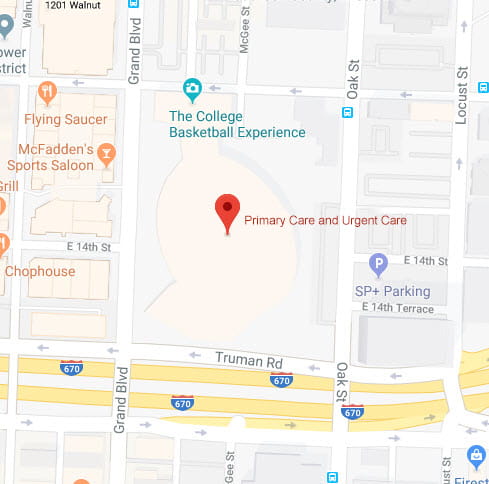 3. Urgent Care, T-Mobile Center
3. Urgent Care, T-Mobile Center- T-Mobile Center
- 1403 Grand Blvd.
- Kansas City, MO 64106
Office Contact: -
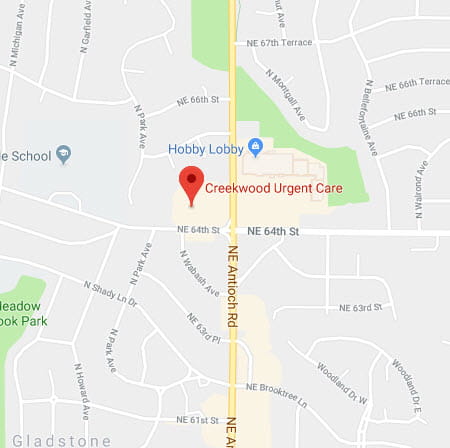 4. Urgent Care, Creekwood
4. Urgent Care, Creekwood- 6420 N. Prospect Ave.
- Gladstone, MO 64119
Office Contact: -
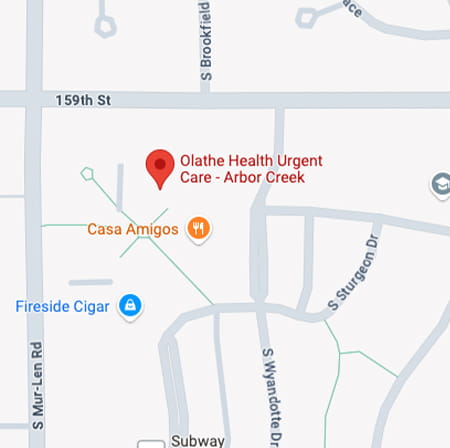 5. Urgent Care, Arbor Creek
5. Urgent Care, Arbor Creek- 16538 W. 159th Terrace
- Olathe, KS 66062
Office Contact: -
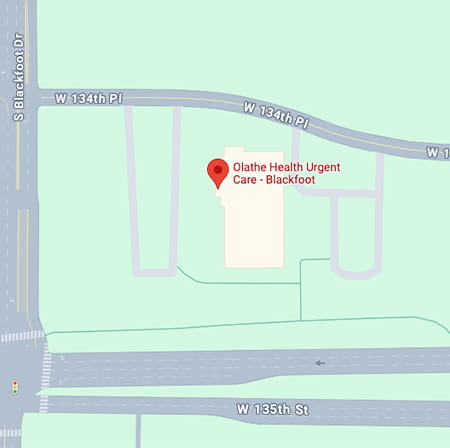 6. Urgent Care, Blackfoot
6. Urgent Care, Blackfoot- 15435 W. 134th Place, Suite 101
- Olathe, KS 66062
Office Contact: -
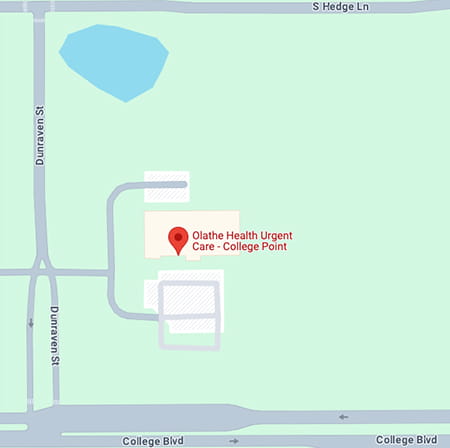 7. Urgent Care, College Point
7. Urgent Care, College Point- 23450 College Blvd.
- Olathe, KS 66061
Office Contact: -
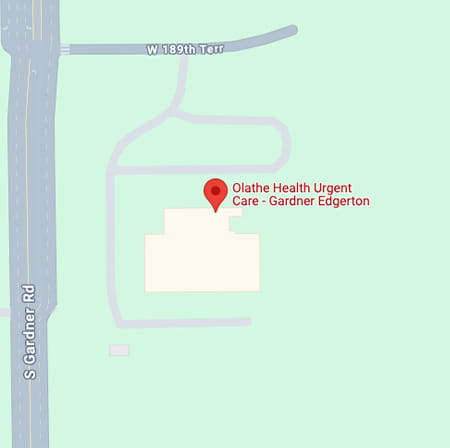 8. Urgent Care, Gardner Edgerton
8. Urgent Care, Gardner Edgerton- 29475 W. 189th Terrace
- Gardner, KS 66030
Office Contact: -
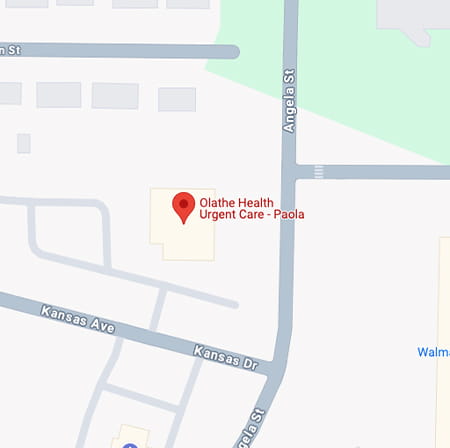 9. Urgent Care, Paola
9. Urgent Care, Paola- 1318 Kansas Drive
- Paola, KS 66071
Office Contact: -
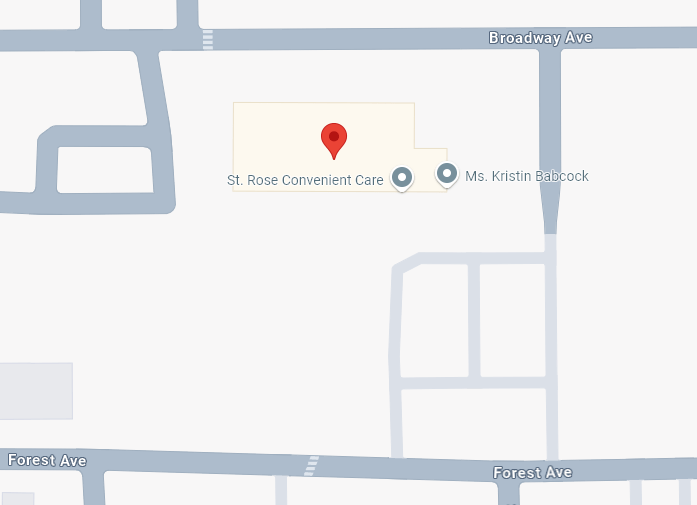 10. St. Rose Medical Pavilion Convenient Care Walk-in Clinic
10. St. Rose Medical Pavilion Convenient Care Walk-in Clinic- 3515 Broadway Ave.
- Great Bend, KS 67530
Office Contact:

Same-day care for orthopedic injuries
We offer walk-in care in Overland Park for acute orthopedic injuries, including sports-related injuries, such as fractures, strains and sprains. Walk-in hours are weekdays 8 a.m.-7 p.m. and Saturdays 8 a.m.-2 p.m.
How and when to use urgent care
Urgent care can provide quick access to medical help for conditions that don't warrant a visit to the emergency department.
Urgent care offices also provide services that may not be available in traditional doctor’s offices, including X-rays, some lab work and tests such as electrocardiograms. Urgent care offices may also be more convenient because you can walk in without an appointment, in a location close to where you live or work.
Visit urgent care for
- Asthma and allergy symptoms
- Sore throats
- Coughs
- Fevers
- Rashes
- Minor burns
- Headaches
- Vomiting
- Flu-like symptoms
- Simple fractures or sprains
- Cuts that might require stitches
Go to an emergency department for
- Serious head injury
- Difficulty breathing
- Severe pain
- Loss of consciousness
- Throwing up or coughing up blood
- Bleeding that won't stop
- Severe allergic reactions that include face swelling or itching throat
- Seizures
- Chest pain
- Fevers in babies 3 months old or younger
- Pregnancy issues
- Any symptoms that make it impossible to walk, breathe or perform other basic functions
Urgent care video visits
We can use urgent care video visits for most of the health needs typically seen in an in-person urgent care setting.
We cannot prescribe or refill medications, write notes for employers or for workers' compensation, treat broken bones or perform testing through urgent care video visits. We cannot treat serious conditions, like head injuries or breathing difficulties. If your need is an emergency, call 911 or go to the nearest emergency department.
If you are setting up an urgent care video visit for a minor, you will need to create a MyChart account for them or request proxy access to their current account. Email the completed form to MyChart@KUMC.edu. This process typically takes 2-3 business days. Meanwhile, seek in-person urgent care or call 913-574-2273 (CARE) for assistance.
Urgent care FAQ
Our urgent care centers allow you to see a physician, physician assistant or advanced practice registered nurse without an appointment. Scheduled visits may be available but are not required. You should use urgent care for medical problems that require prompt attention but are not serious enough to require a trip to the emergency department, and when you’re not able to see your primary care provider.
Although many of our urgent care locations offer same-day and next-day scheduled visits, it is never necessary to schedule an appointment for our urgent care offices. Unless scheduled for a specific visit time, patients are seen on a first-come, first-served basis or based on medical need.
- Abrasions
- Acne
- Asthma
- Athlete’s foot
- Back pain
- Cold and flu
- Constipation
- Cough
- COVID-19 concerns
- Diarrhea
- Dry skin/eczema
- Extremity pain
- Eye irritation
- Fatigue
- Fever
- Headache
- Heartburn
- Insect bite
- Nausea
- Pink eye
- Poison ivy
- Possible fracture
- Rash
- Respiratory symptoms
- Seasonal allergies
- Sinus
- Sore throat
- Stuffy nose
- Stye
- Urinary tract infection
- Vaginal discharge/irritation
- Vomiting
Our urgent care is for those who are 6 months and older.
It can be difficult to predict how long you will have to wait to be seen by a member of our urgent care medical team. We offer scheduled urgent care visits and do everything possible to see those patients at the time scheduled. We continue to care for walk-in patients on a first-come, first-served basis unless others arrive with more urgent medical needs. For example, patients with severe breathing problems, patients who are bleeding or patients who may have life-threatening medical conditions will be seen first.
You can visit KansasHealthSystem.com/OnMyWay to get an estimated wait time before visiting an urgent care office.
In some cases there is an additional after-hours charge for urgent care visits, which is usually covered by most insurance carriers. Some insurance carriers may require higher copays. Please call the number on the back of your insurance card for questions about coverage. In addition, some medications, tests and/or medical supplies may not be covered under your plan and will be your responsibility.
Go to the emergency room for injuries that are serious or that may be life-threatening. These include:
- Amputation of a body part
- Chest pains that could be related to heart attack
- Dehydration
- Electrical shock
- Fractures that are open or angulated
- Severe abdominal pain
- Severe bleeding due to injury or trauma
- Severe burns
Call 911 immediately if you have a medical emergency and need transportation to the hospital.
When you have tests done, there are 2 ways to get results. The preferred method to access your health information is through MyChart. Get more information on MyChart and learn how to sign up. Otherwise, a clinical staff member will contact you regarding any abnormal results.
For billing questions, call 913-588-5820 Monday-Friday, 8 a.m.-5 p.m. You may also message our Customer Service team through MyChart.




